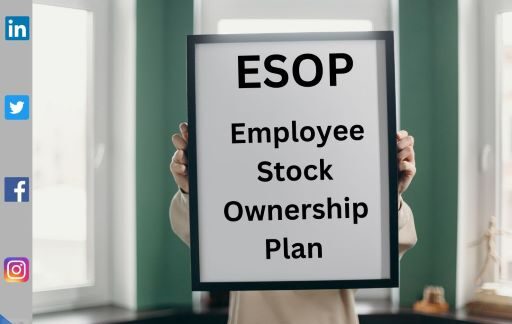
Table of Contents
What is ESOPs? Is ESOP beneficial for employees?
The Upsides and Downsides of ESOPs
Firstly, ESOPs can be a great way to encourage employees to stay with a company for the long term. By offering ownership in the company, employees have a vested interest in its success and are more likely to remain committed to their jobs. This can help companies reduce turnover and retain talented staff.
Additionally, ESOPs can provide employees with a valuable source of retirement income. As the company grows and the stock price increases, the value of an employee’s ESOP holdings can also grow. This can be a significant source of retirement income, particularly for those who have worked for the company for many years.
Read This Blog : Shaping the Algorithms of Social Media
ESOPs can also offer tax benefits for both employers and employees. For employers, contributions to the plan are tax-deductible, and for employees, distributions from the plan can be taxed at a lower rate than regular income.
One of the major advantages of ESOPs is that they can help align the interests of employees and employers. When employees own a stake in the company, they have a vested interest in its success and are more likely to work hard to ensure that the company performs well. This can lead to increased productivity, better customer service, and ultimately greater profitability for the company.
ESOPs can also be a valuable tool for companies looking to attract and retain top talent. In today’s competitive job market, offering an ESOP can be a way to differentiate a company from its competitors and attract employees who are looking for a long-term commitment from their employer.
Read This Blog : Why Choose International University of Monaco
Here are some advantages of ESOPs:
- Employee Ownership: ESOPs allow employees to become owners of the company they work for. This creates a sense of ownership and pride among employees, leading to higher levels of engagement and commitment.
- Incentivizes Performance: When employees have a stake in the company’s performance, they are incentivized to work harder and smarter to achieve success. This can lead to increased productivity and profitability.
- Attracts and Retains Talent: Offering an ESOP can be a valuable tool for companies looking to attract and retain top talent. ESOPs provide a unique benefit that can differentiate a company from its competitors and attract employees who are looking for a long-term commitment from their employer.
- Tax Advantages: ESOPs offer tax advantages for both employers and employees. Contributions to the plan are tax-deductible for employers, and employees can defer taxes on the value of their ESOP holdings until they retire.
- Diversification: ESOPs can be a valuable tool for diversifying a company’s ownership structure. By selling shares to the ESOP, a company can raise capital and create liquidity for existing shareholders without diluting their ownership stake.
- Exit Strategy: ESOPs can provide a valuable exit strategy for business owners who are looking to retire or sell their business. By selling their shares to the ESOP, owners can cash out their equity while ensuring that the company remains independent and employee-owned.
- Social Benefits: ESOPs can have positive social benefits by creating jobs and promoting local economic development. By promoting employee ownership, ESOPs can help to create more stable and equitable communities.
Read This Blog : The Story of Nithin Kamath
Here are some disadvantages of ESOPs:
- Risk of Overconcentration: ESOPs can be a risky investment for employees if they invest heavily in company stock. This creates a concentration risk where the employee’s retirement savings are overly dependent on the company’s performance. If the company’s stock price drops significantly, the employee could lose a substantial portion of their retirement savings.
- Lack of Diversification: ESOPs are not a diversified investment, which can lead to a lack of portfolio diversification for employees. If the company’s stock price drops, employees could lose a significant portion of their retirement savings, as they do not have investments in other companies to offset the loss.
- Limited Liquidity: ESOPs are not a liquid investment, which means that it can be difficult for employees to sell their shares if they need cash. This lack of liquidity can be a disadvantage for employees who need cash for emergencies or other purposes.
- Complexity: ESOPs can be complex to administer, which can be a disadvantage for smaller companies with limited resources. The administrative costs of establishing and maintaining an ESOP can be significant.
- Dependence on Company Performance: ESOPs are dependent on the company’s performance, which means that if the company performs poorly, the value of the employee’s ESOP holdings may decrease. This could have a negative impact on the employee’s retirement savings and financial well-being.
- Limited Control: ESOPs do not give employees voting rights on how the company is run. This means that employees may not have a say in major decisions that affect the company’s future.
- Limited Returns: ESOPs may not provide the same level of returns as other investment options. Employees may be better off investing in a diversified portfolio of stocks and other investment vehicles to maximize their returns over the long term.
However, it’s important to keep in mind that ESOPs do come with some potential risks. The value of company stock can be volatile, and employees who invest heavily in the ESOP may be at risk of losing a significant portion of their retirement savings if the stock price drops. Additionally, ESOPs are not a diversified investment, meaning that employees may be overly exposed to the performance of a single company.
ESOPs can be a beneficial tool for employees who are looking for a long-term commitment from their employer and a potential source of retirement income. However, it’s important to carefully consider the risks involved and to ensure that you maintain a diversified investment portfolio. As with any investment, it’s important to do your research and consult with a financial advisor before making any decisions.